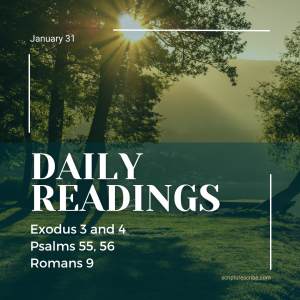

Thoughts on the readings for May 31st (Joshua 17, Isaiah 23,Hebrews 3, 4, 5)
Joshua 17 covers the allotment of land to the tribe of Manasseh. Joseph was Israel’s favourite son and the one that always delighted his father, like our Lord Jesus Christ did those things that pleased His Father. To Joseph, although he was not the firstborn son, was given the blessing and double portion as if he were in fact the firstborn. So too of our Lord Jesus – Psalm 89:27-29. And so Israel blessed the sons of Joseph – Ephraim and Manasseh – and gave them a double allotted portion in the Promised Land. So two Christ’s children – Jew and Gentile – will inherit the earth
Romans 4:13; Hebrews 2verses 10-13. So after Joshua chapter 16 spoke of Ephraim’s inheritance it is appropriate that chapter 17 tells of Manasseh’s tribal allocation. Chapter 17 says that the numerous descendants of Manasseh receive land on either side of the river Jordan. The inheritances are described here. The chapter also tells us about the way in which the daughters of Zelophehad are likewise qualified to inherit along with male heirs. Like the two previous chapters of Joshua this one too has a disturbing ending with verses 12-18 speaking of Manasseh’s failure to carry out the command of the LORD in destroying the Canaanites.
Isaiah 23 is a prophecy about Tyre and Sidon. Tyre was the chief city of the Phoenician kingdom and closely allied with her sister city Sidon. These were settled by the Hittites who came from a powerful civilisation of the Hath-hi in Turkey. In the zenith of their power this kingdom rivalled the Egyptians and the Assyrians. The Phoenician’s were the greatest maritime nation of that time sending their navies as far as the Tarshish of the west – Great Britain. Verse 3 says that Tyre was the merchant navy of the world. Verse 6 explains how the mantle of maritime supremacy was relocated from Tyre to Great Britain who in the history of the last few hundred years has ruled the seas. Verses 11-14 speaks of the loss of naval greatness would be taken from her by the LORD in modern times. Tarshish. Verses 15-18 says that there would be a revitalisation of Tarshish’s powers after a 70 year epoch – the time of one monarch. We today are witnessing Great Britain reestablishing her old trading patterns with those nations of her commonwealth. This is at the close of the reign of Elizabeth 2 after a rule of seventy years.
Hebrews 3 and 4 bring us to the next section of the book. Christ is greater than Moses; and greater than Joshua. Neither of these great, divinely appointed men could bring faithful believers into the Promised Land; neither of them could bring them into the rest promised in Messiah’s kingdom. Verses 1-5 of chapter 3 say that, despite Moses’ greatness (he was the greatest man living in his era – Numbers 12 verses 1-7) he was, still after all, only “a servant in God’s house”. What a contrast to our Lord Jesus Christ, who is as God’s Son the builder of the house (indeed, the builder of ALL things) and the heir, therefore, of the universe. And we, as part of that house, have an eternal inheritance providing we are, like Moses, faithful servants on that house. Chapter 3 verses 7-4 verses 13 explain that, “there is a rest that remains for the people of God”. Chapter 3 verses 7-11 are a word for word quotation from Psalm 95 verses 8-11. The incident being referred to is found in Exodus 17 verses 1-7 at a place called both Massah and Meribah. It was the place where Israel strove contentiously with God. The place where Moses strikes the rock upon God’s command and out gushed water, as a river that follows Israel during their wandering in the wilderness for the greater part of 40 years. Then the water stops and Israel again grumble and ask if God is among them. Moses, out of frustration, for the second time strikes the rock ie almost 40 years after the first time. Moses claims glory for bringing water from the rock (1 Corinthians 10 tells us that rock was Christ). The place is renamed “temptation”,or in the Hebrew “Meribah” hence the references in Exodus 17; Psalm 95; Psalm 78 verses :20-22, 41; Hebrews10 verses 26-29. The two incidents 40 years apart serve as a summary of the nation’s attitude during their wanderings. The great lesson for Israel, and for us, is that, although God showed patience, it is limited to while “Today” still exists. Indeed even after Joshua (Greek “Jesus”) brings the nation into the Promised Land, ie the very Land that Moses is forbidden entry, because he struck the rock on the 2nd occasion; neither Moses, or Joshua could give them the kingdom rest. That task remains for a greater “Joshua”, ie Jesus (the Greek form of the Hebrew Joshua) who will give faithful believers a thousand years (Millennial) rest (Greek “the keeping of a sabbath rest” ie on the Biblical principle of a day for a thousand years see 2 Peter 3 verses 8-9). The writer says we need to keep working now that God may grant you that rest. How powerful and inspiring are the words from verse 12, “God’s Word is living and energetic; and is discerning of our thoughts and intentions”. It can, if we let it, separate us from what is sensual and fleshly; and it can direct us into the paths of God. Chapter 4 verses 16 to chapter 5 verses 10 introduces us to our great High Priest – the Lord Jesus Christ. In chapter 4 verses 16-18 Jesus, because of his righteous life, has passed through the heavens. And like us, Jesus has been tested in all respects just as we have been (1 John 2 verses 15-17). Yet unlike us he has never sinned. But in his suffering through trials he understands and sympathises with our temptations; and is able to aid us (as our intercessor) in the needy times of our lives. Chapter 5 verses 1-10 both compares our Lord Jesus Christ with Aaron; and also shows Christ to be superior to Aaron in every respect of his priesthood. Chapter 5 verses 11 to chapter 6:12 warns against apostasy. Chapter 5 verses 11-14 makes an appeal for the Hebrew readers to open their dull ears, so that they might respond to God’s Word. These readers who have been in the Truth for many years were as though they needed the milk of God’s Word once more; and had failed to progress to meat (which should happen naturally as we grow). The listeners needed to be strengthened to practise righteousness (Greek word for “exercised” AV is “to train in the gymnasium”.
Audio Player
More Episodes
All Episodes>>Create Your Podcast In Minutes
- Full-featured podcast site
- Unlimited storage and bandwidth
- Comprehensive podcast stats
- Distribute to Apple Podcasts, Spotify, and more
- Make money with your podcast











